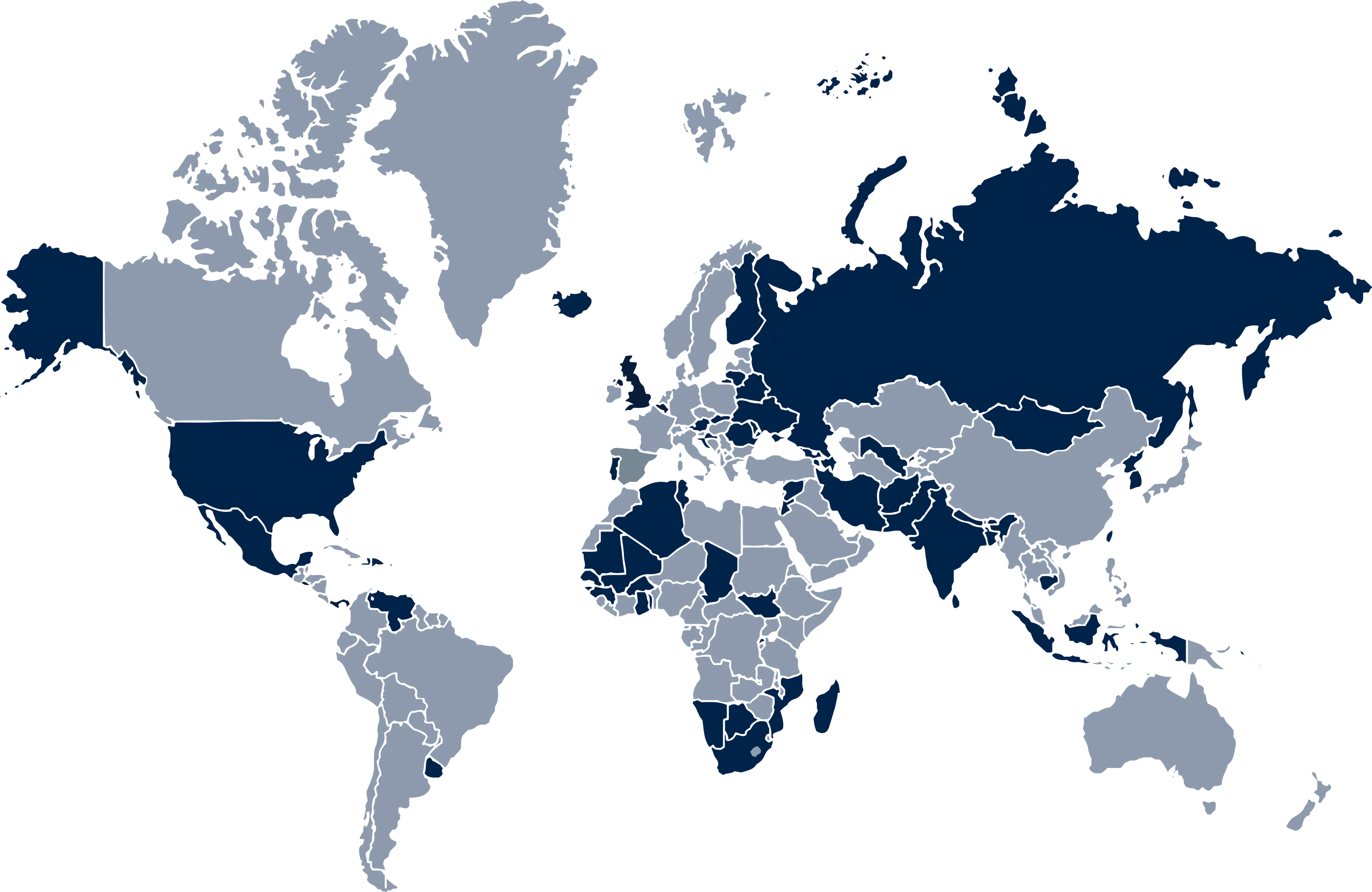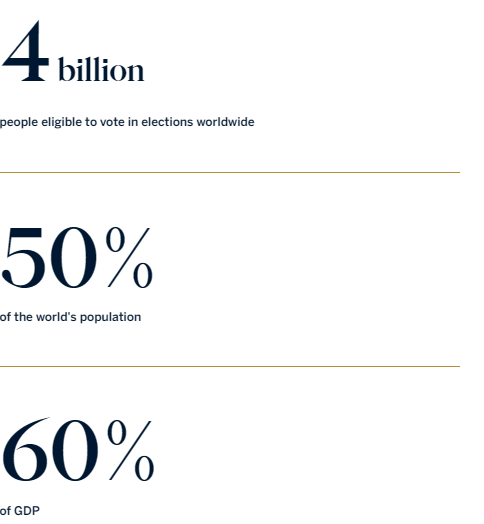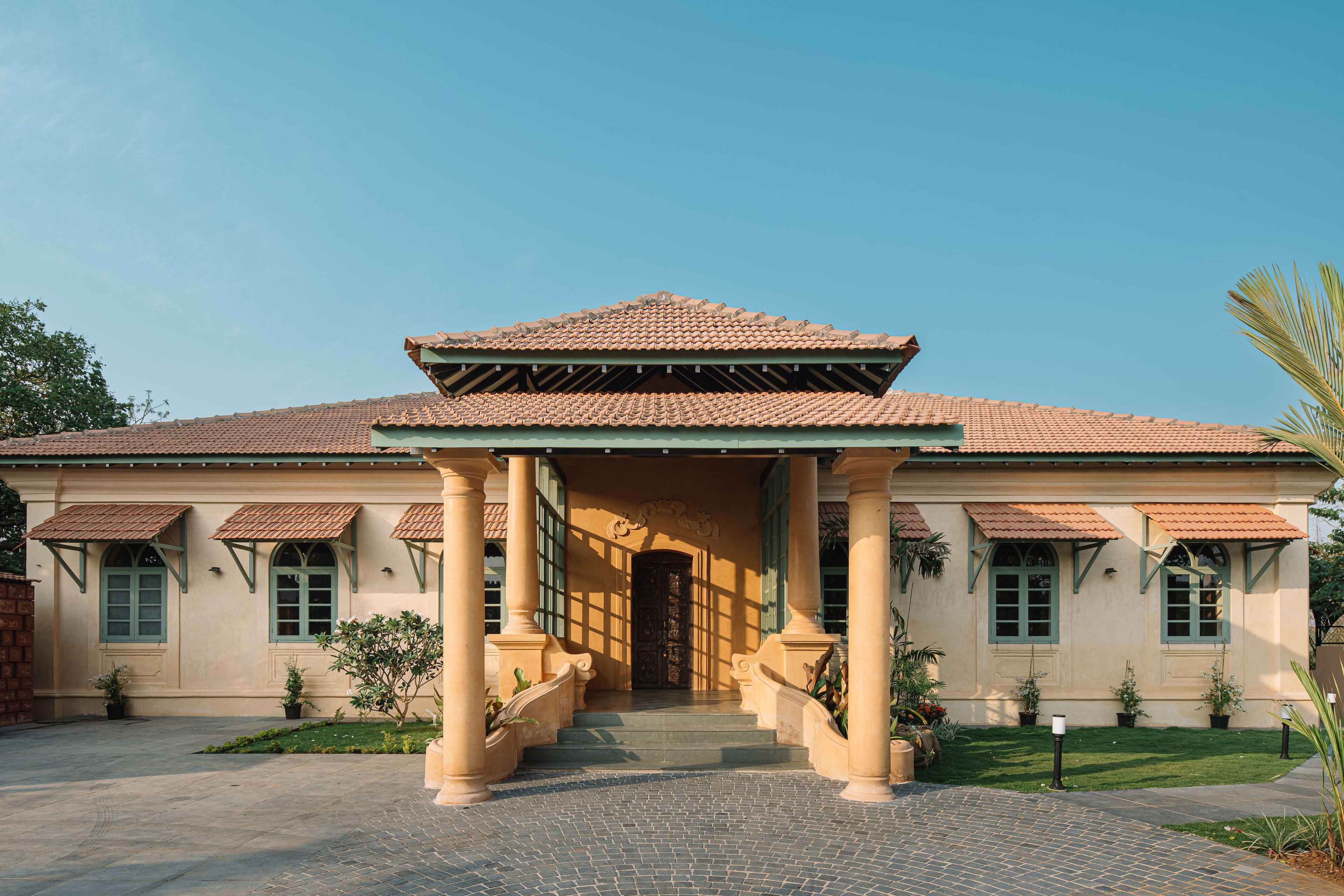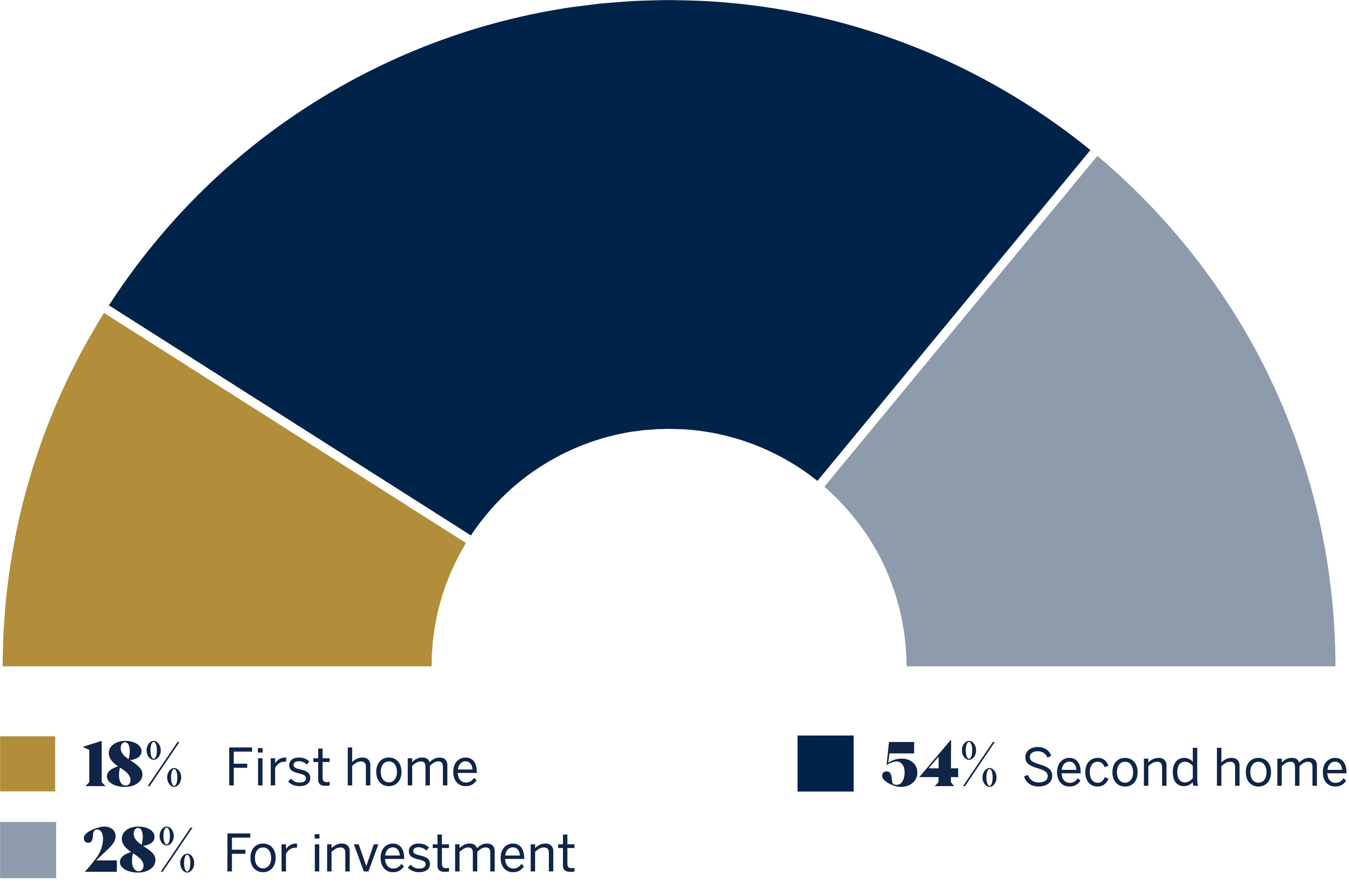People
Power
More than half of the world’s population will vote in national elections this year, so how will political change affect real estate markets?
"
THERE’S A LOT MORE CONVERSATION ABOUT POLITICS THIS YEAR, AND A LOT OF POLARIZATION. BUT, WHEN IT COMES TO REAL ESTATE, PEOPLE ARE MORE FOCUSED ON INTEREST RATES THAN POLITICS.
"
Russ Anderson, president and chief executive officer,
Briggs Freeman Sotheby’s International Realty in Dallas, Texas
This year marks an unprecedented wave of national elections across the globe. According to Reuters and The Economist, about half of the world’s voting-age population—over four billion people spanning nearly 80 countries that collectively account for more than 60% of global GDP—will be eligible to cast their ballots in what Time magazine has dubbed “the ultimate election year.”
The most closely watched election is in the U.S., the world’s largest economy and third-largest nation by population, which will elect its next president in November 2024. The Democratic and Republican party platforms’ approaches to real estate are starkly different. Democrats are looking to improve housing affordability through initiatives such as tax credits and down-payment assistance, while Republicans aim to stimulate economic growth through pro-business, low-tax, low-regulation policies.
“The U.S. 2024 presidential election represents a critical moment for investors and financial analysts around the world—with the potential to have an impact on several areas, from economic policies to specific markets, the outcome could shape the global economic future,” says Renata Victorino, director, Bossa Nova Sotheby’s International Realty in São Paulo, Brazil. Victorino and her colleagues in South America are keeping a keen eye on what is happening in the U.S., even as municipal elections take place in Brazil in October 2024 to decide the leaders in more than 5,000 cities and towns across the country.
Meanwhile, in other areas of the world, India—the largest nation by population—started its massive six-week election process in April 2024 and voting for the parliament of the 27-member European Union took place in June 2024.
These events could have a dramatic effect on real estate markets for years to come, with the outcomes already playing out in countries that held elections in the first half of 2024, and the anticipation of changes in the political landscape felt in countries that have yet to hit the polls.
A view of the Kennedy Center from the Residences at the Ritz-Carlton Georgetown in Washington, D.C.
TTR Sotheby’s International Realty
The election effect
“Historically, the housing market tends to experience a slowdown in activity during presidential election years,” according to a report issued by the Nationwide Mortgage Bankers in March 2024. “This trend is particularly noticeable in the months leading up to the election as individuals prioritize political developments over real estate decisions.”
“Every election year the market typically softens,” says Claire Reynolds, managing partner, United Kingdom Sotheby’s International Realty in London, who has been involved in luxury property sales for two decades. “Uncertainty can create a wait-and-watch attitude, resulting in a market with temporarily subdued growth.”
Christie-Anne Weiss, global advisor, TTR Sotheby’s International Realty, Washington, D.C., who has more than 40 years’ experience in navigating the market during presidential elections, agrees. “From my experience, what we see again and again is that our market gets quieter around October,” the month before Election Day, she says. “Once the election is over and we know who the president is, business will resume as normal. It is buyer psychology; people do not make major investment decisions when there is imminent uncertainty.”
This effect spans the world. Pre-election uncertainty “slows down housing sales, specifically in metro markets, and impacts stock market activity, especially if a coalition government looks like it’s coming into power,” says Ashwin Chadha, chief executive officer, India Sotheby’s International Realty, whose background as a seasoned banker with BNP Paribas, Citibank, and Barclays has been invaluable to his work in real estate.
A sense of political stability, on the other hand, can have an unsurprisingly positive effect. Since India’s incumbent Bharatiya Janata Party (BJP) has held onto power in this year’s elections, Chadha observes that the real estate market is likely to benefit. “The current government has reiterated its intentions for high spending, drawing in investments to boost the manufacturing sector,” he notes. “Both infrastructure spending and manufacturing augur positively for the property market, including luxury real estate.”
Manufacturing is one of the industries that has led to the rise in the country’s millionaires, which numbered 850,000 in 2022, an increase of 473,000 since 2012, according to research by the Swiss bank Credit Suisse. It also calculated that the number of millionaires in India grew annually during that time by around 8.5%, compared with an average GDP growth of 5.6%.

Nearly 80 countries (dark blue on map) are holding elections in 2024, according to news sources including The Economist, Reuters and Time magazine. This equals:

Hein Pretorius, real estate associate, Lew Geffen Sotheby’s International Realty in South Africa, says May 2024 was a “watershed” election for South Africa. “This is the first year since 1994 that the ruling African National Congress [ANC] party does not have an outright majority,” he says. “The ANC is going to have to choose a partner in a coalition government, and it has a number of options.” The party’s main opposition, the Democratic Alliance, which has pushed a major land reform policy that would transfer state-owned land to individuals, has said it is open to coalition talks.
In the U.K., meanwhile, the Conservative and Labour parties went head-to-head in a general election on July 4, 2024 with the Labour party winning by a clear majority.
“The recent elections offer an opportunity for change. Against the backdrop of an optimistic interest rates outlook, housing plays a big part of the new government’s manifesto,” says Reynolds. “Only 18% of buyers [in central London] are purchasing their main home, 54% are purchasing a second home, and the other 28% are buying for investment,” Reynolds adds, citing statistics gathered by her firm. “International investment is hugely vital for the prime central London market, with the three most dominant groups of buyers being from the U.S., the Middle East, and China.”

A stunning 150-year-old home in North Goa, India, where elections kicked off in spring 2024.
India Sotheby’s International Realty
Case study: home buyer statistics in central London in 2024.


This 11-bedroom house in central London offers spaciousness that is rarely found in the city. Elections in the U.K. occurred in July 2024.
United Kingdom Sotheby’s International Realty
Keeping watch on interest rates
While real estate agents the world over are watching out for political changes, they are keeping an even closer eye on interest rates, which may play an even bigger role in homeowners’ decisions to buy and sell than who occupies the seats of power. This is because interest rates are set by the Federal Reserve’s Federal Open Market Committee, a group of 12 banking leaders, and not by those seated in the White House or Congress.
“There’s a lot more conversation about politics this year, and a lot of polarization,” says Russ Anderson, president and chief executive officer, Briggs Freeman Sotheby’s International Realty in Dallas, Texas, who has three decades of experience in real estate and banking. “But, when it comes to real estate, people are more focused on interest rates than politics. No matter who wins, if interest rates start falling, I think people will buy. If they stay elevated, people will remain on the sidelines.”
Weiss echoes this view, saying that the major drivers in property markets this year are “interest rates and the broader economic environment, more so than the upcoming election.” While interest rates are affecting the market at various price points, Weiss sees transactions taking place across the board, especially with the increase in luxury inventory in the Washington, D.C. area. “It is a wonderful time, in particular, for cash buyers,” she says.
In Brazil, rates are already going down, and are expected to fall further, Victorino points out. The country’s central bank reduced the basic interest rate by half a percentage point in March 2024, reducing it from 11.25% to 10.75%. “The change helps to make financing for real estate more accessible,” she says. According to a survey of economists released by Brazil’s central bank, the expectation was that by the end of 2024, rates would reach single digits. “The most affluent buyers do not depend on credit, but for investors, the reduction in interest rates makes real estate a more interesting option, favoring those seeking long-term profitability.”
As for India, strong economic fundamentals are being bolstered by falling interest rates along with rising wealth. “The economy is growing by close to 8%, and inflation is now pretty much under control,” says Chadha. “According to a report by Jefferies, a leading global, full-service investment banking and capital markets firm, India is expected to be the world’s third-largest economy by 2027. It is currently the fifth-largest economy, having just displaced the U.K., and our prime minister has an aggressive economic plan.” Such economic growth would also affect property markets.

This 2015 home in Austin, Texas, sits on the coveted location of Lake Austin.
Kuper Sotheby’s International Realty
An interconnected world
While real estate agents are watching their own local elections closely, the property market is highly interconnected globally, so they have an eye on other elections as well, and the U.S. election looms the largest.
Chadha, even in his bullishness, recognizes concerns from abroad. “There are always risks,” he says. Internationally, a slowdown in the U.S. could have “a cascading effect on foreign investment.”
But Victorino points out that “investment in the real estate market is one of the most stable, and the easiest to recover, even in unstable scenarios.”
Experts including Lawrence Yun, chief economist at the National Association of Realtors (NAR), agree that investing in real estate is solid in the long-term. According to a report issued by the NAR in 2023, upper-income households in the U.S. saw the value of their homes increase by an average of US$150,800 over the past 10 years. “This analysis shows how homeownership is a catalyst for building wealth for people from all walks of life,” says Yun, adding that, on average, homeowners are able to build “a net worth about 40 times higher than that of a renter.”
“An uncertain market can present good opportunities for those with an appetite for higher-risk investments, or those who take a longer-term view,” says Reynolds. “For those taking a five-year or longer view, we’re forecasting good growth.”



